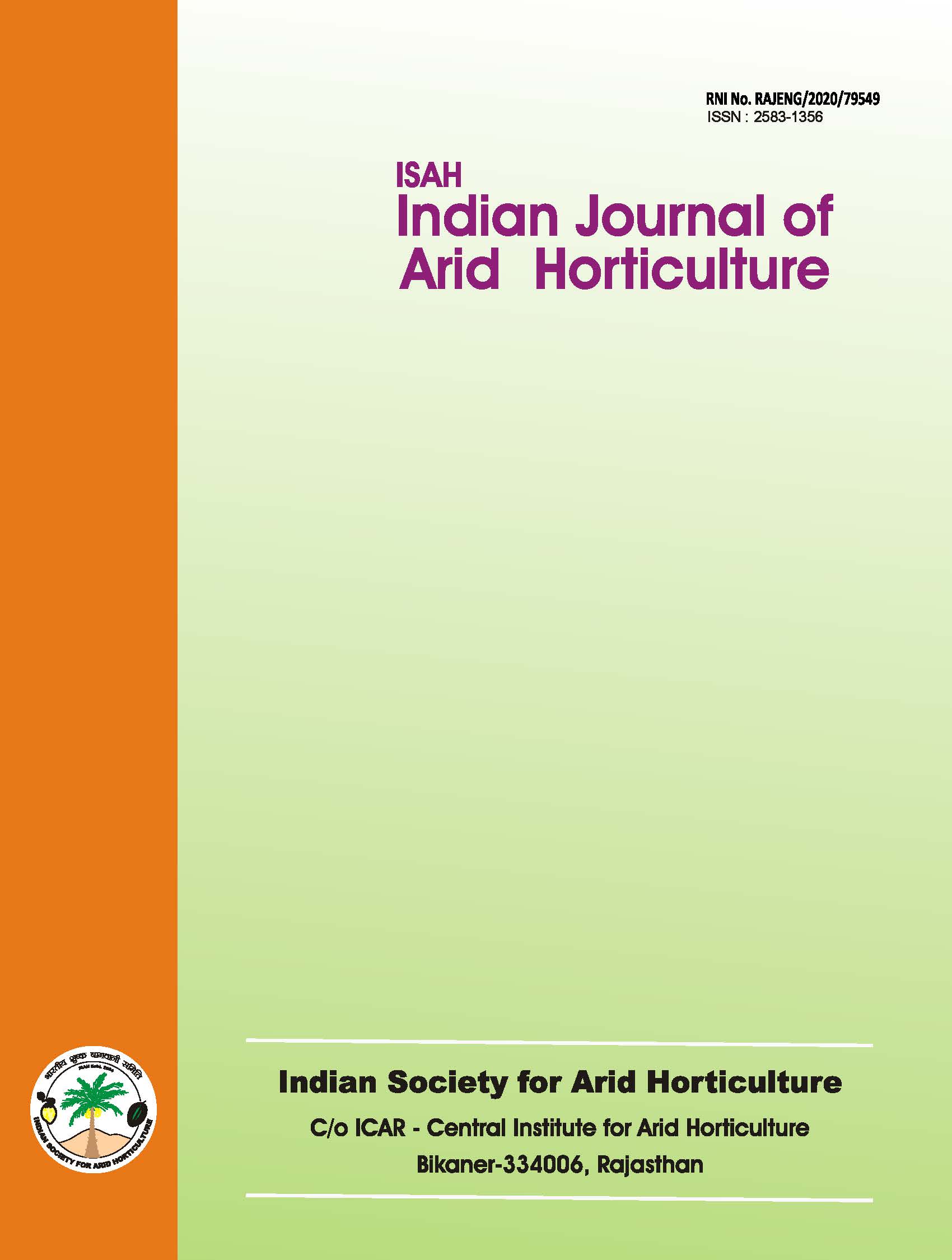Screening of Custard apple (Annona squamosa L.) genotypes for fruit rotresistance
DOI:
https://doi.org/10.48165/ijah.2022.4.1.3Keywords:
Custard apple, fruit rot, Colletotrichum gloeosporioides, AFC, MBIM, MDITAbstract
Custard apple (Annona squamosa L.) is a hardy dryland horticultural crop with high export potential and significant economic benefits. However, fruit rot, caused by Colletotrichum gloeosporioides Penz, is one of the major diseases that can lead to substantial losses in yield. The study revealed that all 30 genotypes were infected by the disease. The Attached Fruit Culture (AFC) method showed that a higher number of genotypes exhibited a highly susceptible reaction when inoculated using the Mycelial Bit Inoculation Method (MBIM) compared to the Micro Droplet Inoculation Technique (MDIT). In the MBIM method, the genotypes Vrudheshwar-3, Verul-2, Karkhel, Vrudheshwar-4, Vrudheshwar-2, Telgaon Local, Humnabad Local, and Dhanagarawadi-3 exhibited moderate resistance. In the MDIT method, Vrudheshwar-3, Verul-2, and Karkhel showed resistance to the disease. Additionally, under natural field conditions, Vrudheshwar-3, Verul-2, Karkhel, Humnabad Local, Dhanagarwadi-3, and Vrudheshwar-4 were recorded as resistant to fruit rot disease.
Downloads
References
Anonymous. 2020. ICAR- AICRP on Arid Zone Fruits. Annual Report 2020. Pp. 235.
Anonymous. 2022. ICAR- AICRP on Arid Zone Fruits. Annual Report 2021. Pp. 246.
Gaikwad, A P. 2002. Studies on fruit rot of custard apple caused by Colletotrichum gloeosporioides penz. Ph.D. Thesis. M.P.K.V., Rahuri, Maharashtra, India.
Hayes, W.B. 1953. Fruit growing in India 3rd edition, 338-357,
Kitabistan, New Delhi.
Mukerji, K. G. and Bhasin, J. 1986. Plant diseases of India: A source book. Tatta Mc.Grew-Hill Publishing Company Ltd. New Delhi. Pp. 468.
Munaut, F., Hamaide, N. and Maraite, H. 1997. A standardized microdroplet inoculation technique for analysis of the interaction between Colletotrichum gloeosporioides and Stylosanthes guianensis. Parasitica, 53 (4): 117-125.
Padule, D.N. and Kaulgud, S.N. 1993. Disease response of custard apple varieties to fruit rot caused by C. gloeosporioides. Proc. Vth Zonal Meeting (Western Zone), IPS, New Delhi, held at PKV, Akola Pp. 73.
Rocha, J. de-R-de-S., Oliveira, N.T.de and Menezes, M.de. 1998. Comparison of inoculation methods efficiency for evaluation of Colletotrichum gloeosporioides isolates pathogenicity on passion fruits (Passiflora edulis). Brazilian - Archives of Biol. And Technol., 41 (1): 145-153.
Venkataratnam, L. and Satyanarayanaswamy, G. 1958. Studies on genetic variability in Annona squamosa. Indian Journal of Horticulture, 15: 228.
Venkataratnam, L. 1959. Sitaphal and other annonaceous fruits in India. Farm Bulletin, (54).

